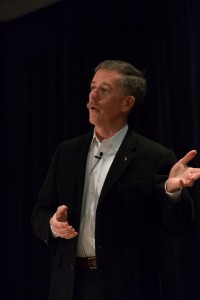By Dave Malone
Sr. Law Enforcement Education Coordinator, American Military University
Law enforcement and space travel share a high degree of risk in much of what they are required to do —the margins for error in both professions are very narrow!

Dr. James Reilly, Associate Vice President at American Military University, shared lessons he learned about teamwork and leadership from his 13 years working for NASA as an astronaut. Reilly spoke to law enforcement groups during the Illinois Law Enforcement Alarm System (ILEAS) conference on March 4 and the Wisconsin Association of Swat Personnel conference on March 5.
During his NASA career, Dr. Reilly went into space on three missions, completing five space walks. During these space missions, all the astronauts worked 16-hour days, completing many tasks where any level of failure could lead to death.
So, how did the astronauts meet these challenges and how were they able to react to unexpected problems that arose while completing such tasks?
The lessons Dr. Reilly and his fellow astronauts learned from their successes and failures boiled down to this:
- Training and lots of it
- Communication between all members of the team, both in space and on the ground
- Respect for all members of the team
- Having integrity at all times
- Trusting each other
Further, social interaction among not only the astronauts, but also among all the members of the team on the ground, vastly improved the efficiency and the success of their missions. During his presentation, Dr. Reilly stressed that learning to mix “fun” into their training and implementation of their plans was a crucial ingredient to the success of his missions!
Continuous Improvement (CI) – An attitude of continuous improvement was constantly applied to the space teams’ processes, procedures and tools. CI is recognition that the margins between success and failure are very narrow. This requires testing and training in order to maximize efficiency, such as:
- Details missed CAN kill you
- Question everything
- Act like everyone has your life (career) in their hands!
PBED – Plan, Brief, Execute, Debrief, and REPLAN as you train and seek continuous improvement. Do you have a plan? Is it working? Are you on schedule-ahead or behind? If you are behind, what do you need to get back on schedule? REPLAN.
OODA LOOP– Observe, Orient, Decide, and Act. As you develop a culture and practice (over and over) these principles and practices become second nature. As a result of this principal, your ability to address unexpected outcomes increases.
Dr. Reilly pointed out that he and the NASA teams learned from their failures and their successes. He emphasized that it is important to recognize that PEOPLE are critical in developing a culture that concentrates on making decisions based on “proving our plans are safe” rather than “proving our plans aren’t safe.” Too often, teams get caught up in letting the desire to “check the box” drive their decisions: Schedules ought to be guidelines, NOT imperatives!
Dr. Reilly wrapped up his presentations pointing out that with successful teams, the mission is critical and EVERYONE on the team has a critical role to success. FUN is contagious and cements teams together. Whether in space or in law enforcement, know your team and encourage your team to adopt the overall philosophy that all aspects of our missions are “everyone’s job.”
Comments are closed.